News Summary
As Global Asbestos Awareness Week approaches, the HSE urges manufacturing firms to manage asbestos risks responsibly as health concerns rise.
Beware of Asbestos: A Call to Action Ahead of Global Asbestos Awareness Week
Manufacturing Firms on High Alert
As the countdown to Global Asbestos Awareness Week (1-7 April) begins, Britain’s workplace regulator, the Health and Safety Executive (HSE), is sending out an urgent reminder to manufacturing firms about their responsibilities concerning asbestos. For manufacturing facilities housed in buildings constructed before 2000, the message is clear: it is critical to properly assess, manage, and monitor asbestos risks as mandated by law.
Hidden Dangers Lurking in Older Buildings
Many older manufacturing sites may still harbor a treasure trove of asbestos-containing materials (ACMs), which were extensively utilized in construction and industrial applications between 1950 and 1980. This includes not only buildings but also machinery and industrial equipment. Any structure built or refurbished prior to 2000 poses a potential risk of containing these hazardous materials, further complicating the safety landscape for workers.
Common Sources of Asbestos
ACMs can often be found in a variety of materials, such as:
- Pipe lagging
- Insulation boards
- Asbestos cement products, including profiled roof sheets and wall panels
- Floor coverings
- Asbestos sprayed coatings
Additionally, older industrial ovens and complex pipework may also pose risks if they contain asbestos materials, creating an urgent need for thorough risk assessments.
The Human Cost of Negligence
The costs associated with poor planning and management of asbestos can be devastating, resulting in significant human suffering for victims and their families. Asbestos-related diseases are alarmingly identified as the leading cause of work-related deaths in Great Britain, often with symptoms that take decades to reveal themselves after exposure.
Legal Obligations and Consequences
Employers have a legal obligation to manage any identified asbestos present on their premises, and failure to comply can lead to severe penalties ranging from substantial fines to imprisonment. Furthermore, incidents involving asbestos can severely damage company reputations, affect employee morale, and inflate operational costs.
Worrying Statistics from the Last Five Years
In the past five years alone, there have been over 100 prosecutions related to asbestos, resulting in 150 legal breaches. This stark reality underscores the need for companies to take asbestos safety seriously and adhere to established legal requirements.
Campaigns to Raise Awareness
In line with the push for better compliance and awareness, initiatives like the “Asbestos – Your Duty” campaign are backed by industry organizations. These campaigns aim to disseminate vital information regarding the legal responsibilities companies have towards asbestos management and encourage proactive measures.
Asbestos Management Guidelines
The HSE has developed a comprehensive set of six-step guidelines to help employers navigate their legal duties concerning asbestos management. These guidelines emphasize the requirement of identifying, assessing, and managing any asbestos risks, drawing attention to the imperative that any work involving asbestos materials must be conducted only after thorough risk assessments have been completed and appropriate controls implemented.
The Cost of Inaction
As exposure to asbestos typically has a lengthy latency period, early diagnosis of related diseases remains a significant challenge. Alarmingly, the UK has the dubious distinction of having the highest incidence of mesothelioma cases globally, due to extensive historical asbestos exposure. Data indicates that more than 5,000 deaths annually can be attributed to asbestos-related cancers, with over half resulting from mesothelioma.
Regulatory Challenges and Future Steps
A recent report highlights alarming disparities in children’s asbestos exposure in the UK compared to other countries, revealing that they can face exposure levels up to ten times higher than in nations like Germany. Currently, about 6 million tonnes of asbestos remain within approximately 1.5 million buildings across the country, impacting schools and NHS trusts. Critics argue for more active measures, underscoring the need for a 40-year deadline for removal of asbestos from public and commercial buildings.
Conclusion: A Call for Action
As authorities critique the regulatory framework in the UK for being less stringent than that of other European nations, now is the time for organizations to take decisive steps in managing asbestos risks seriously. Public health initiatives and campaigns are more essential than ever to raise awareness and reduce the prevalence of asbestos-related diseases—reminding everyone that the fight against this hazardous mineral continues.
Deeper Dive: News & Info About This Topic
HERE Resources
Contractor Sentenced for Asbestos Hazard Endangering Elderly Woman
Kenyan Government Takes Bold Steps to Eradicate Asbestos Nationwide
Quincy Jones: A Comedian’s Heartfelt Journey Through Cancer
The Spotlight Shines on Dean Omar Branham Shirley Attorneys for Advocacy in Mesothelioma Cases
Malignant Pleural Mesothelioma Market on the Rise: A Closer Look at Trends and Innovations
UK Parliament: A Time Bomb of Asbestos and Fire Risks
Concerns Mount as Westminster Faces Fire Risks Amid Restoration Delays
The Asbestos Legacy: Unveiling the Hidden Dangers of a Deadly Mineral
Vivace Therapeutics Secures $35 Million for Mesothelioma Drug
Groundbreaking Advances in Mesothelioma Treatment: Vivace Therapeutics Secures Significant Funding
Additional Resources
- The Guardian: Labour Must Get Asbestos Out of Schools Urgently
- Wikipedia: Asbestos
- Al Jazeera: A Long and Lethal Legacy in the Shadow of Asbestos in the UK
- Google Search: Asbestos exposure
- The Guardian: UK Children Exposed to More Asbestos Than Other Countries
- Google Scholar: Asbestos health impact
- Encyclopedia Britannica: Asbestos
- Google News: Asbestos awareness



















